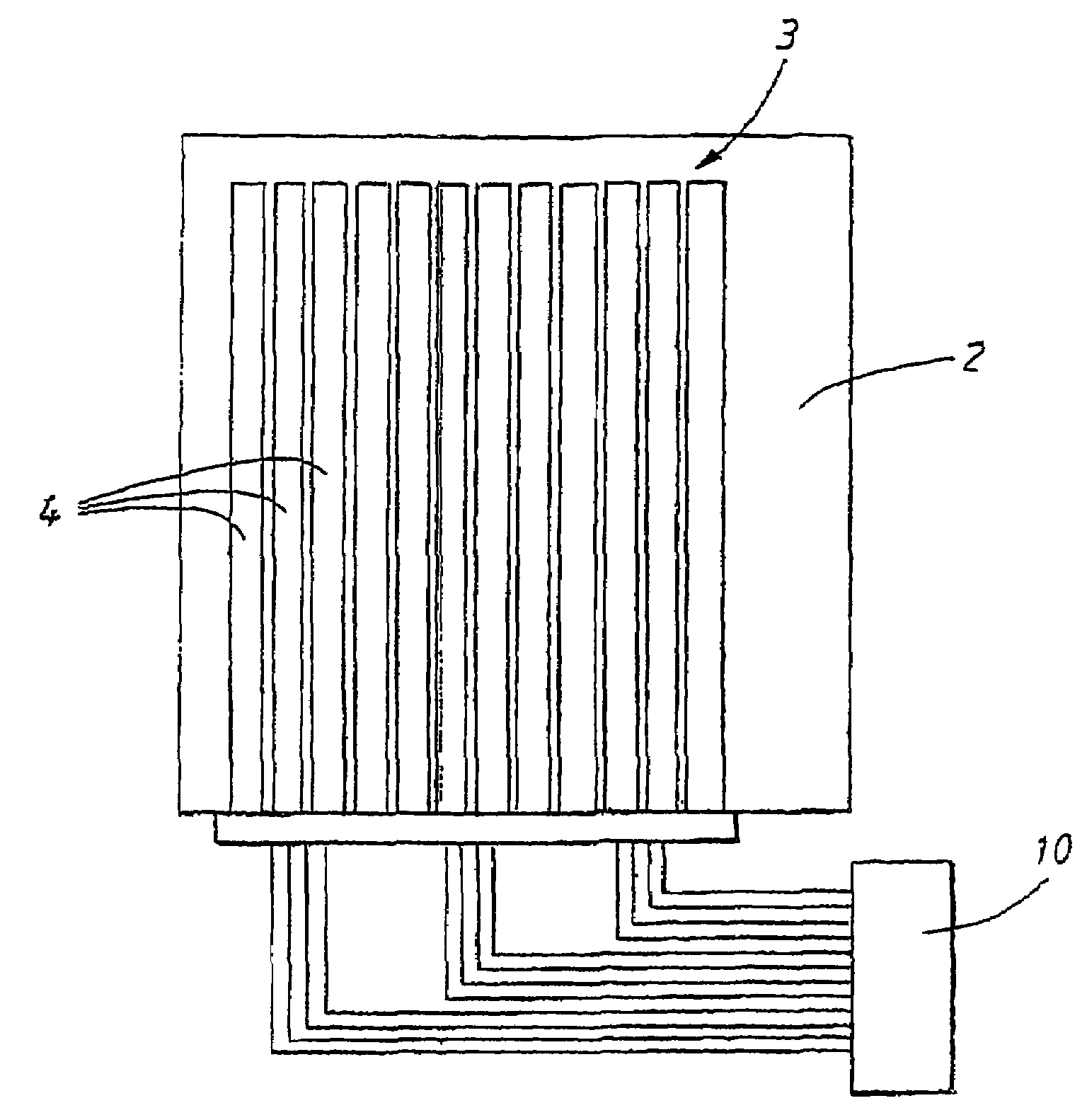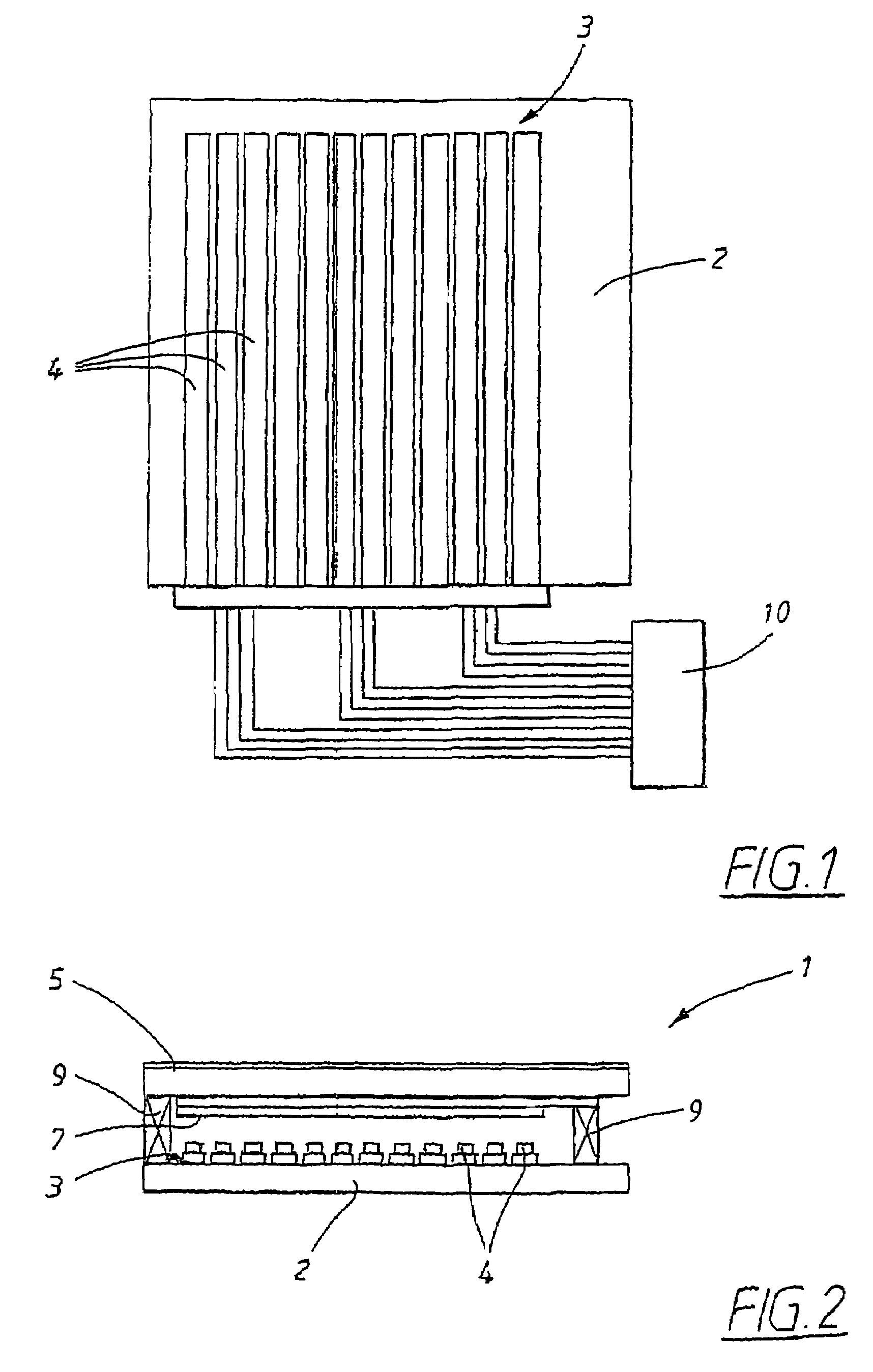Method of controlling an electrochromic matrix display and electrochromic display
a matrix display and display technology, applied in the field of electrochromic matrix displays, can solve the problems of inability or inability to connect one separate line to each pixel, matrix displays without short-circuit memory will have non-uniform greyscales, and complex manufacturing of active matrix displays, etc., to achieve fast switching of electrochromic passive matrix displays, facilitate higher contrast, and uniform contrast
- Summary
- Abstract
- Description
- Claims
- Application Information
AI Technical Summary
Benefits of technology
Problems solved by technology
Method used
Image
Examples
embodiment 1
[0020]In embodiment 1 the invented method is used to preserve image patterns in an electrochromic matrix display with only two greyscale states (dark and light). In this embodiment the method is identical to SCHEME 1 in all respects except the choice of electric signals on the data lines. These are, as in SCHEME 1, voltage waveforms with two different voltages UDARK and ULIGHT that are applied on the data lines to selected dark and light pixels, respectively. However, in embodiment 1 UDARK is different for different data lines. UDARK has a monotonic dependence on the number of dark pixels in the column: UDARK(X)=U′DARK+ΔU(X), where U′DARK is a constant, x is the number of dark pixels in the column, and ΔU is a function of x. ΔU is chosen such that the contrast between dark and light pixels becomes uniform across the matrix for arbitrary image patterns. The absolute value ofΔU is increasing with increasing x. The sign of ΔU is such that the absolute value of (UDARK−ULIGHT) always dec...
embodiment 2
Time-Division of the Line Addressing Periods
[0027]This embodiment is as embodiment 1 intended for preserving images in an electrochromic matrix display with two greyscale states. It is also based on SCHEME 1 but differs from embodiment 1 in two fundamental ways: Firstly, the same two voltages ULIGHT and UDARK are used on all data lines irrespective of the distribution of dark and light pixels in the columns. Secondly, each line addressing period is divided in two unequally long sub-periods, A and B. The voltages on the data lines Udata are UDARK in A and ULIGHT in B. For selected light pixels the time in A, tA, equals 0 and the time in B, tB, equals tline. For selected dark pixels the time-division between A and B depends on x. tB is equal to tline for a selected dark pixel in a column where only this pixel is dark, i.e., x=1. tB decreases monotonically for increasing x but reaches never zero. In a variant the dependence of tB on x is linear, i.e., tB=tline+(x−1)Δt, where Δt is a ne...
embodiment 3
Scheme with Three Select-Line Voltages
[0028]This embodiment is a variant of embodiment 1 for matrix displays with two greyscale states (dark, light). The principal difference is that it is based on SCHEME 2. SCHEME 2 is modified in a similar way as SCHEME 1 is modified for embodiment 1. In the dark frames UDARK is changed into UDARK(x)=U′DARK+ΔUDARK(x) whereas ULIGHT is constant in all columns, ULIGHT=U′LIGHT. In the light frames the situation is reversed: UDARK=U′DARK and ULIGHT(x)=U′LIGHT+ΔULIGHT(x). The values of ΔUDARK(x) and ΔULIGHT(x) are restricted in the same manner as in embodiment 1. Furthermore, as in embodiment 1 preferred variants ΔUDARK(x) and ΔULIGHT(x) are both linearly dependent on x.
[0029]It is also obvious that the time-division of the line-adressing periods in embodiment 2 may be applied also on SCHEME 2 such that a uniform contrast is attained in all columns.
PUM
| Property | Measurement | Unit |
|---|---|---|
| voltage | aaaaa | aaaaa |
| electrochromic | aaaaa | aaaaa |
| greyscale | aaaaa | aaaaa |
Abstract
Description
Claims
Application Information
 Login to View More
Login to View More - R&D
- Intellectual Property
- Life Sciences
- Materials
- Tech Scout
- Unparalleled Data Quality
- Higher Quality Content
- 60% Fewer Hallucinations
Browse by: Latest US Patents, China's latest patents, Technical Efficacy Thesaurus, Application Domain, Technology Topic, Popular Technical Reports.
© 2025 PatSnap. All rights reserved.Legal|Privacy policy|Modern Slavery Act Transparency Statement|Sitemap|About US| Contact US: help@patsnap.com



